In a traditionalist and officially Christian-Orthodox society, those who decide to go another way are often criticized and remain misunderstood. Baptism, religious weddings, and funerals are some of the very important steps in the life of an Orthodox Christian. Faithful parents will have their children and grandchildren baptized, and when the time comes – buried, according to the order of the Christians and the priest. But what do they do if they’re are atheists? Moreover, what if two atheists refuse to baptize their child?
Nadia and Ion Rusnac married three years ago, and in May last year they became David’s parents. The discussion of religions came at the very first meetings of young people. They found out that, by coincidence, they both identified themselves as atheists, although both come from Christian-Orthodox families. “Yes, little, I believed in God. Children are very easily influenced, and I’m part of a very religious family, especially my grandmother. We also knew Our Father, and various other prayers. And then… I do not know exactly what was the moment, in which I took a completely different path,” Nadia explains. Her husband says his position on religion has taken shape when he was about 15 years old following the events in the country and the behavior of religious people in our country. “That’s what influenced me not to believe in anything. Better to believe in myself more than in religion and church,” says Ion. Initially, the parents of the two refused to accept atheism in their home, believing that “it was a joke” and that “it would pass”. Since then, it has been ten years.
Being declared atheists, Nadia and Ion vehemently refused to have a religious wedding, as well as baptize their son, David. “Of course they told us we had to celebrate, everyone did, and we said ‘No’ and that was the whole talk,” says Nadia. Although their parents have become more comfortable with the fact that the two preferred to formalize their relationship to the state, the fact that their nephew will remain unbaptized until he decides it for himself, does not seem to leave their minds. “They can not accept that” David will not have his angel.” “How will he grow up like this? They will not get him to school…”, says Ion.
The young parents believe that questions about God and religion will appear to the little boy from the early years of kindergarden, where he would start learning prayers for children, but have already decided that they will refuse to attend religious classes at school. “Obviously, the poems” Angel, my angel “or genre can not be forbidden to teach them, because all the children will learn. But that’s just like a poem about Santa Claus. I will explain to the child what religion means. “You, when you grow big and you will come to the conclusion that you believe that there really is something, my dear, I support you in everything. You want, we go, we baptize you when you’re great. I support you absolutely in all. But that must be your decision. “I do not want to influence him, absolutely not,” says Nadia.
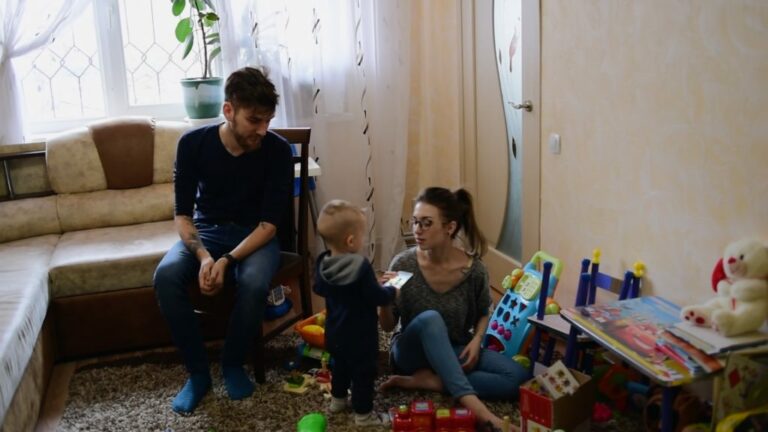
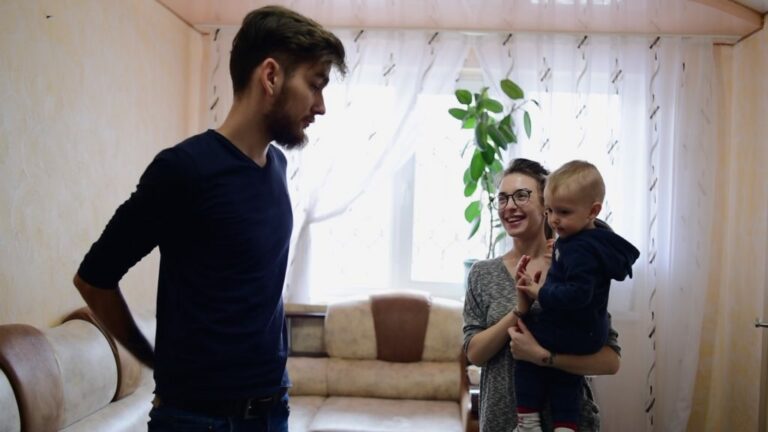
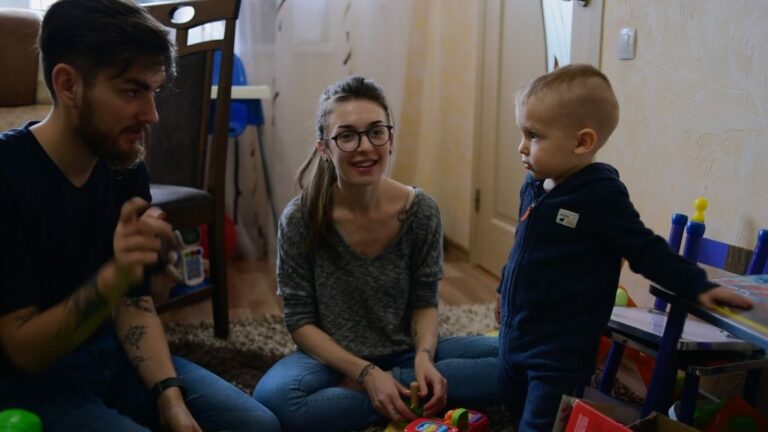
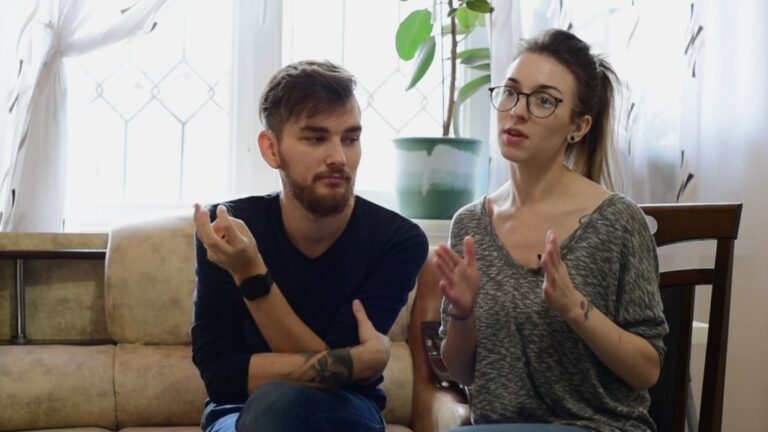
If the education is guided by the Bible in an Orthodox-Christian family, then the common sense, the Penal and Civil Code serves as that in the Rusnac family. “In every case, you must act as a human being, first of all,” explains Nadia.” Anything that does not lead to jail is good. If there is a chance to get there – it’s bad,” adds Ion. Do not beat, kill, steal, learn well at school – these are on the list of lessons that will be passed on to little David.
“It’s not just about us, it’s also about the teachers and the entire society. For the most part, society is increasing it. We will not keep him at home for ever. If he starts drinking and smoking, I won’t always be around to break his cigarette or throw his bottle. It depends on society, friends, the group of people who will surround him at the time. I will do my best to raise a good man. A respectful man who helps people around us, but it does not entirely depend on us. The baby depends on us until the age of about 16, until he forms his group of friends. After that, he decides what he wants and what he doesn’t,” says Nadia.
During the last five years, more than 121 thousand marriages have been officially registered in the Republic of Moldova. Their annual number decreased by 2041 from 2012 to 2016. The number of live newborns decreased by about two thousand (from 39.4 thousand to 37.4 thousand). Over the same period, more than 54,000 marriages have lapsed over an average of 11 years.
Starting from these figures, but also from the fact that, according to the last “census” of the population of the Republic of Moldova, most of them declared themselves Christians, I tried to find out how many of these children were baptized and how many of the marriages were registered at the Civil Status Office.
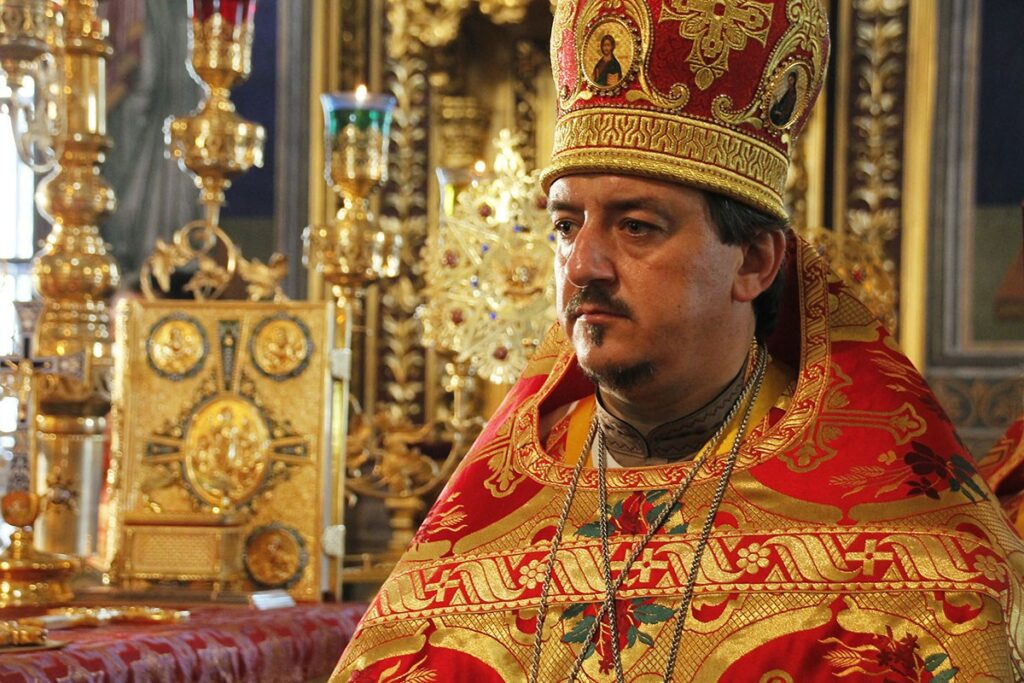
Starting from these figures, but also from the fact that, according to the last “census” of the population of the Republic of Moldova, most of them declared themselves Christians, I tried to find out how many of these children were baptized and how many of the marriages registered at the Civil Status Office were also followed by a religious wedding. However, the secretary of the Metropolitan Church of Moldova, the mitrophorous Protozoa, Vadim Cheibaş, explained to me that it is not possible to find out this answer, but he confirmed that the number of religious weddings had dropped significantly.
Traditions and superstitions related to baptism
on the Romanian historical territory
- The pregnant, heavy, fat woman has to observe certain prohibitions in the interest of the being living inside her layers. She must never kick a dog or a cat, otherwise the baby will have facial hair.
- The child must not see “measles” (fire) or the child will be on fire.
- The mother does isn’t allowed to steal plums or other similar fruit, it makes the baby have spots on his face.
- The mother must not to cut anything on big days, that cuts the child’s ear or lips.
- The mother must not look at ugly faces, or at a dying animal in the process of being killed, otherwise the baby will be the ugly.
- If the mother desperately wants to eat, she must eat, otherwise the baby will be lost.
- In many villages in Moldova, it is believed that, when crossing the decks, the dead is helped by those who baptized him, Thus, according to the religion, it is considered a great sin if you refuse to baptize a baby, because you lack worthy help when you cross the decks once you’re dead.
- If the child is born on a feast day, he will be a robber, a fornicator and a bully.
- In order to give birth more easily, the woman must drink water from an unbuttoned “lock” otherwise her hair will never be untangled.
After the child is born, the mother must perform the things she wants her newborn to do later on: she must a wood if she wants him to be a good woodcutter or must hammer if she wants him to be a good fierar, and so on. These actions are of magical value. - The first bathing (when baptizing) of the child is usually done with cold water, in order for him to be strong, chilled in the cold. In that water (later in the swing), basil, rose and a knife are placed – in order to not “let not the evil spirit liquefy him,” and for him to “never be influenced by the evil spirit.”
- The belly button must be cut by the midwife, a more skilled woman in the village. It must be buried in a corner of the house and, when the child is 3 years old and a great craftsman, it must be untied by him.
- The who child born with a shirt on his head is lucky. This shirt gathers on a root of basil and is good for cure.
- The baptismal name is always placed according to a saint, on the day the child was born. If this name is not quite right beautiful, a second one is allowed for the family usage. The civil status must contain the first used name.
- Until the ’90s of the century, in the Bulgarian communities of the Republic of Moldova, a special kiss of the hand could be seen as a reminiscence. The children would kiss the aunt’s hand in a gesture succession: once – above the hand, the second time – touching the forehead of the same place of the wrist, and the third time as well. This was the most popular kiss observed by rural children.



